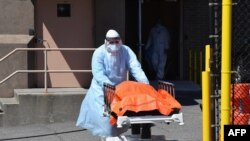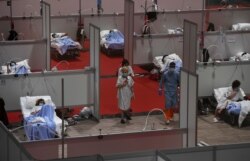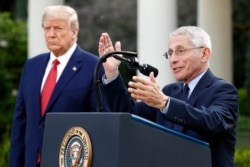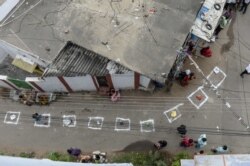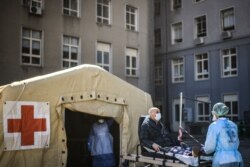The head of the World Health Organization said Friday the coronavirus pandemic has sparked a global crisis that is causing an array of problems beyond rising infections and mounting death tolls.
"We know this is much more than a health crisis," said WHO Director general Tedros Adhanom Ghebreyesus at a regularly scheduled media briefing in Geneva. "We are all aware of the profound social and economic consequences of the pandemic."
Tedros said more than 1 million cases and more than 50,000 deaths worldwide have been reported to the WHO.
But Australian chief medical officer Brendan Murphy told reporters Friday in Sydney the numbers of cases globally is actually up to 10 times higher.
"Worldwide we have passed 1 million infections. But we believe the true number is five or 10 times as much," Murphy said. He said the under-reporting of cases is due to a shortage of testing for the virus in some countries.
The WHO has told countries to significantly ramp up testing for COVID-19, while some observers have noted differences in the way some countries count infections.
Tedros said some countries are "suspending user fees and providing free testing … regardless of a person's insurance, citizenship or residence status," and called on other countries to follow suit.
The importance of testing was reinforced Friday when the Communist Party leader of Wuhan, China, warned the risk of a possible resurgence in the area is still high and that prevention and control measures must continue. Wuhan was where the outbreak began in late December.
Speaking at the WHO media briefing, International Monetary Fund Managing Director Kristalina Georgieva said, "We are now in a recession. It is way worse than the global financial crisis (of 2008). It is a crisis that requires all of us to work together."
"We know many countries' health systems are weak," Georgieva said, adding it was "paramount" for the more stable economies to "place these countries at the center of our attention." She also said, "This is, in my lifetime, humanity's darkest hour."
U.S. supplies, recommendations
The United States has about one-quarter of all the world's cases with at least 258,000 infected individuals, more than any other country. More than 6,600 people are dead.
The White House is expected to soon recommend that people wear masks to prevent the spread of the coronavirus, after initially saying masks were not necessary to halt the spread of the disease.
New York City Mayor Bill de Blasio has already recommended New Yorkers wear a scarf, bandanna, or some homemade covering over their mouths and noses – but not a surgical mask, He says those should be reserved for medical professionals.
Los Angeles Mayor Eric Garcetti is also asking people to cover their mouths in public.
Dr. Anthony Fauci, the top U.S. infectious disease expert who advises President Donald Trump, told CNN on Thursday night he did not understand why some U.S. states have not issued stay-at-home orders as the country battles the coronavirus.
"If you look at what's going on in this country, I just don't understand why we're not doing that," Fauci said.
Trump has been reluctant to issue a nationwide order, leaving the decision instead to the individual states, even in the face of the growing number of deaths due to the virus.
About 30 states and the District of Columbia have ordered residents to stay home, traveling only for essentials.
The U.S. health care system has been overwhelmed with patients as the supply of personal protective equipment, or PPE, for medical workers dwindles. Nurses and doctors are increasingly talking to news media about conditions in the hospitals.
One nurse told ABC News that she and her colleagues feel like "sheep going to slaughter" when they go to work.
Victims of trafficking
The Organization for Security and Cooperation in Europe issued a warning Friday about the impact of COVID-19 on the world's most vulnerable people. It said in a statement: "Victims of trafficking face exceptional danger as entrenched systems of exploitation are thrown into disarray and traffickers seek to maintain their revenue through greater violence or new forms of exploitation." The statement said the victims include not only women and girls, but out-of-school children spending additional time online and people who have been forced into labor.
The OSCE added, "In the case of trafficking for organ removal, one of the darkest and least addressed forms of trafficking, the impacts of COVID-19 are starting to raise alarm."
The U.N. special rapporteur on Felipe González Morales, and the rapporteur on trafficking in persons, Maria Grazia Giammarinaro, issued a statement Friday about the regularization of migrants "whenever necessary, in view of facilitating their access to health services during the fight against the pandemic."
"No one should be left behind in this global fight against the pandemic. Governments must adopt measures ensuring every individual in the national territory, regardless of their migration status, is included and has access to health services in order to achieve successful containment of the COVID-19 pandemic," the U.N. experts said.
Increased aid, restrictions
The World Bank has approved nearly $2 billion in funds for 25 of the world's poorest countries to battle the pandemic.
India, Pakistan, Sri Lanka, Afghanistan, and Ethiopia will get most of the first payments. The money is specifically designated for critical medical supplies, including masks and ventilators.
World Bank President David Malpass says the institution could provide as much as $160 billion in such help over the next year.
India's lockdown of more than 1 billion people has left hundreds of millions homeless and without food, prompting Prime Minister Narendra Modi to beg for their forgiveness.
In Brussels, NATO foreign ministers have tasked the alliance's top military officer, U.S. Air Force General Tod Wolters, "to coordinate the necessary military support to combat the crisis, to speed up and step up assistance."
Wolters will procure cargo planes and other aircraft to deliver medical supplies as well as surplus stocks across the 30-member bloc.
Portugal announced a ban on all commercial flights arriving at its airports and its citizens will not be allowed to visit other towns except for work. The new restrictions take effect April 9 and are set to last five days.
The government is also pardoning inmates sentenced to two or fewer years behind bars to prevent a spread of the virus in jails.
Portugal has a little more than 9,000 confirmed cases.




